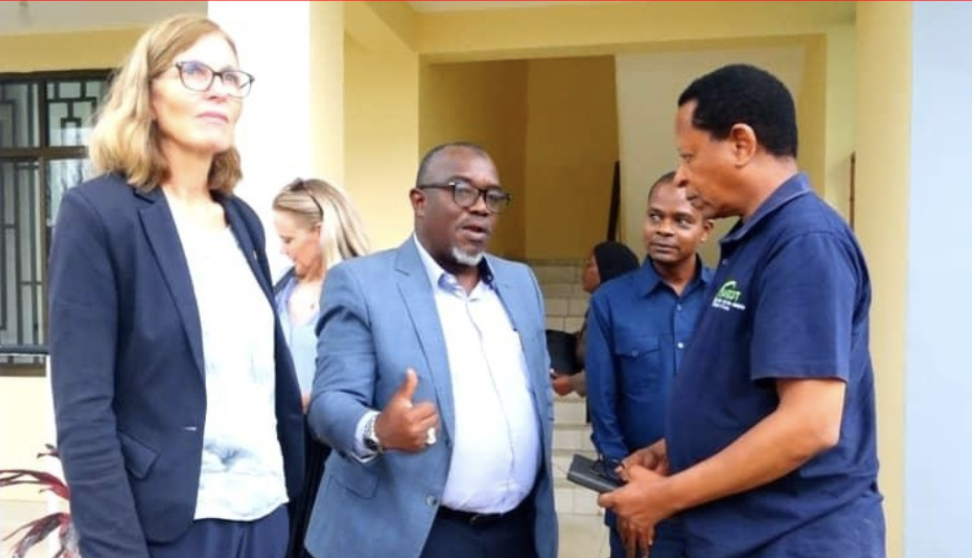Kilimokwanza.org Reporter
In a meeting held on April 22, 2024, with Hon Adam Malima, the Regional Commissioner of Morogoro, Norwegian Ambassador to Tanzania, Tone Tinnes reaffirmed Norway’s unwavering commitment to supporting Tanzania’s agricultural sector. This collaboration aims to empower local farmers by providing them access to modern technologies and broader markets, thereby enhancing their productivity and economic stability.
A Vision for Growth and Modernization:
Ambassador Tinnes expressed enthusiasm about Tanzanian agriculture’s progress toward international competitiveness. This success is largely attributable to significant governmental efforts to integrate modern farming technologies. “The use of advanced technology in agriculture is not just a step towards modernization but also a strategic element in fortifying the economic relationship between Tanzania and Norway,” Tinnes noted.
She elaborated on Norway’s role in this transformative journey, which involves not only the introduction of technologies but also training and capacity building for Tanzanian farmers. This approach ensures that the benefits of modernization reach the grassroots level and lead to sustainable growth.
Regional Focus: The Case of Morogoro
During the discussion, Commissioner Malima outlined the specific strategies employed by the Morogoro region to uplift its agricultural landscape. The region has prioritized cultivating strategic crops such as avocados, cocoa, spices, and oil palm. These crops were selected based on their economic viability and potential to improve the livelihoods of local farmers.
“By focusing on these key crops, we aim to transform Morogoro into a hub of agricultural prosperity, which will contribute significantly to the overall economic health of our region,” Malima explained. He also mentioned the government’s role in facilitating market access and creating favourable policies that encourage agricultural investment and growth.
Spotlight on Sustainable Practices and International Cooperation
The meeting also highlighted the importance of sustainable farming practices that yield high returns and conserve the environment. Norwegian support in this area has been pivotal, introducing practices that reduce soil erosion, improve water retention, and increase crop yields without detrimental impacts on the land.
Ambassador Tinnes pointed out that sustainable agriculture is a cornerstone of Norway’s foreign aid and environmental policies. “We are committed to ensuring that our partnership with Tanzania leads to environmentally sustainable and economically viable agricultural practices,” she stated.
Field Insights: Visit to the Uluguru Mountains
Further emphasizing the practical outcomes of this cooperation, Geoffrey Kirenga, Executive Director of the Southern Agricultural Growth Corridor of Tanzania (SAGCOT), recounted the ambassador’s recent visits to SAGCOt’s Ihemi and kilombero clusters.
This visit was part of a broader initiative to observe and support the cultivation of spice crops, among the strategic agricultural products identified by the regional government.
“The ambassador’s visit was not only an opportunity to witness the innovative farming techniques employed by local farmers but also a chance to engage directly with the community to understand their needs and challenges,” Kirenga noted. He added that such interactions are crucial for tailoring international support to Tanzanian farmers’ specific conditions and requirements.
Future Prospects and Continuing Collaboration
Looking forward, the partnership between Norway and Tanzania is set to expand with more collaborative projects to enhance agricultural productivity and sustainability. Both nations are keen to explore further opportunities to advance agricultural research, pest management, and climate-resilient farming practices.
the reaffirmation of support by Norway underscores a shared vision of prosperity and sustainability in Tanzania’s agricultural sector. This ongoing collaboration fosters economic growth and strengthens bilateral ties, setting a model for international cooperation in rural development. As both countries continue to build on this foundation, the future holds promising prospects for the farmers of Tanzania, potentially setting a benchmark for similar initiatives in other regions of Africa.
